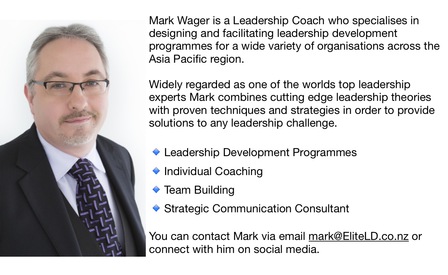Five Ways to Make Your Meetings More Effective
Five Ways You Can Make Your Meetings More Effective
By Mark Wager
“If you had to identify, in one word why the human race has not achieved and never will achieve its full potential, that word be “Meetings” - Dave Barry
What is the biggest waste of time during your working day? If you think meetings are so then you are part of the 47% of the workforce who listed meetings as the biggest waste of their time in a recent survey. Meetings are one of the oldest tools in a Manager's toolbox but it is also one of the most misunderstood and misused. Every Manager holds meetings but very few hold effective meetings. In this article I share some of the techniques that effective Managers use to ensure that their meetings are considered a valuable part of the workday and not a waste of time.
Meetings are not the only way to get updates
Several Managers have meetings as a default function. They block out the same time every week for a meeting for people to share information or to discuss plans. This method is outdated and is no longer effective. If you require information from your team then there are many methods to do this. I know one successful executive who gets his direct reports to block out five minutes at the end of the day to send an email summarising their day. The email is so simple and only takes a few minutes to compose. The email covers three points. Firstly a summary of tasks completed today. Secondly, what results have been achieved today keeping in mind it's one thing to do work but the work is irrelevant unless positive results are achieved. Thirdly and finally, what challenges they have encountered. This should only take five minutes to compose, if it takes longer then they are putting in too much information. This brief summary gives the executive a good idea of what is going on and tells him a lot about the people he has reporting to him.
Keep your meetings brief
From my experience no meeting should go beyond forty five minutes. If the issue can not be resolved within this time then you either don't have the right people at the meeting or they are not prepared. Information regarding the meeting should be sent out to the participants at least twenty four hours prior and by information I don't mean an agenda, I mean the information that people require in order either make a decision or to provide well thought out comments.
Keep your meetings focussed
The mobile phone was voted as one of the top inventions of the past century. It was also voted as one of the top ten worst inventions of the past century. The ability to be contacted at anytime of the day from anywhere in the world is both a blessing and a curse. It puts a lot of pressure on the individuals ability to manage their time and to avoid distractions. If you want your meetings to be focussed then the participants need to be focussed. Turn the phones off. Now for a lot of people that's a terrifying thought but if your participants can't focus solely on the meeting for thirty to forty minutes then either the meeting is not important enough or they are not managing their time well enough and require coaching.
Give people permission to challenge ideas
I worked with a leading firm of architects who have an amazing team. I know a lot of Managers who say that their staff are like family but very few actually mean it. This firm of architects did and they have a very close team and everyone gets along well together. In fact they got along too well, they liked each other so much that there was no conflict. It's often viewed as a negative but every successful team or relationship for that matter needs conflict. If managed correctly decisions are challenged and made more robust, mistakes are avoided and issues are raised and resolved. When I worked with this company the leaders realised that this lack of conflict was preventing progress so together we put in place a solution. At every meeting someone was allocated the duty to find everything wrong with the proposal on the table. The assigned "critic" has full permission to be as critical as possible as long as the focus was on the idea and not people. This ensured that all decisions were robust and far better quality than before.
Make the purpose of the meeting clear
I've heard many stories of people who have been to many meetings where they had no idea of the purpose of the meeting even before I walked into the room and unfortunately this is not an isolated incident. Make people aware so that they can prepare, if the purpose of the meeting is to decide something then supply as much information as possible so that any debate can be well informed and constructive. In this way not only will your meeting take less time but will result in better decisions
You too can make meetings effective as long as you challenge what you have done in the past and look at meetings for what they are, an investment of everyone's time to drive the organisation forward. Ask yourself what return on investment you want from your meetings and plan accordingly.

Posted: Monday 25 April 2016

